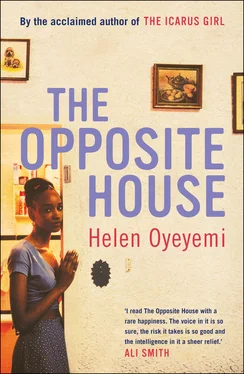Helen Oyeyemi - The Opposite House
Здесь есть возможность читать онлайн «Helen Oyeyemi - The Opposite House» весь текст электронной книги совершенно бесплатно (целиком полную версию без сокращений). В некоторых случаях можно слушать аудио, скачать через торрент в формате fb2 и присутствует краткое содержание. Год выпуска: 2008, Издательство: Bloomsbury UK, Жанр: Современная проза, на английском языке. Описание произведения, (предисловие) а так же отзывы посетителей доступны на портале библиотеки ЛибКат.
- Название:The Opposite House
- Автор:
- Издательство:Bloomsbury UK
- Жанр:
- Год:2008
- ISBN:нет данных
- Рейтинг книги:4 / 5. Голосов: 1
-
Избранное:Добавить в избранное
- Отзывы:
-
Ваша оценка:
- 80
- 1
- 2
- 3
- 4
- 5
The Opposite House: краткое содержание, описание и аннотация
Предлагаем к чтению аннотацию, описание, краткое содержание или предисловие (зависит от того, что написал сам автор книги «The Opposite House»). Если вы не нашли необходимую информацию о книге — напишите в комментариях, мы постараемся отыскать её.
The Opposite House — читать онлайн бесплатно полную книгу (весь текст) целиком
Ниже представлен текст книги, разбитый по страницам. Система сохранения места последней прочитанной страницы, позволяет с удобством читать онлайн бесплатно книгу «The Opposite House», без необходимости каждый раз заново искать на чём Вы остановились. Поставьте закладку, и сможете в любой момент перейти на страницу, на которой закончили чтение.
Интервал:
Закладка:
This is how small my hysteric makes me; this is how far she takes me from speech when it is important that I speak. This is why she must be dissolved.
It is early, or late — 4 a.m. I watch Aaron shaving at the bathroom mirror; he hums the guitar undertow of a Kofi Amese song. And he is careful; his lip wrinkles thoughtfully as he stops after every scrape to consider his chin. It was Papi who gave me the impression of shaving as an early-morning dare-devil ritual, the will-he-won’t-he-slit-his-throat in a wash of soapy lather. Papi winked at the mirror-me, then turned his head from side to side, judging what work was needed. Then he tilted his head upwards, and flashed his razor up and over his jaw, flaying hair from his face in two or three simple strokes. I was certain that he would bleed — it was impossible for his skin not to open up under such provocation. He laughed when I squeaked and jumped high, holding out my hands with a will to catch his life and throw it back into him that way. Then he told me — in a deep African accent that I never tired of his assuming — that my mother had worked a very strong juju for him so that his throat might be cut but he would never die.
When Papi’s hands began to knot up and loll heavy on his lap, he said that he’d decided to accept the dignity of facial hair. His razor rusted in the bathroom cabinet because Papi wouldn’t let Chabella throw it away.
Aaron says to me, ‘That plumber’s coming back tomorrow.’
With one hand to his face, preparing his cheek for the razor, he laughs at me. He begins to say something else, but starts whistling another highlife song instead. When I come to kiss his other cheek, he smiles at the mirror-me as if he knew that that was what I was going to do all along.
Last night Aaron came home with a single nappy pressed flat in its plastic wrapping. It was tiny. I said, ‘There’s a child in the newborn bay that’s missing that.’
Remorse came into his eyes with a speed that made me suspicious. ‘I should give it back?’
There being nothing for me to say to that, he opened the pack and widened the nappy’s waistband with his thumbs. When he looked at me and held the nappy up for me to see properly, his gaze was sceptical.
I laughed at him. ‘What? You thought a baby wouldn’t be that big, or that small?’
His thumbs were still hooked into the elastic. He stretched them wider and said, ‘Maja, come on. To come to this from the womb, where there wasn’t enough space to properly wave your arms and legs about in the first place. I mean, look at this thing. Look at the shape of the leg-holes. And the way you have to tape the waist in. He’ll think he’s been moved to a higher-security prison. He’ll make frequent escapes and we’ll have to lock him up again.’
I remembered to tell him about the kick my son gave me in exchange for a song. He lay his head on my lap and murmured things to my son, things in Ewe not meant for me. Everything was still; everything in the room, every part of me was trying to listen to Aaron’s words and wanting to understand. I took his hand, ready to travel my stomach. But he sat up and said gently, ‘Maja.’ He meshed my fingers with his, touched his lips to mine.
I go home because Papi and Chabella want me to go to Tomás’s sports-day race with them. The first thing I do when I get home is go upstairs to my black and white bedroom. I stand at the window. What I like best about my room is that in the late afternoon, if I am tired, I only have to wait. Then, sunset. Since light refuses to waste itself, it slips onto me, all over me. I lie down on my bed and I don’t have to do anything else. Something else breathes for me. But Chabella will not let me stay in my bed. It is hard to know what is important to Tomás, so we should not take this risk, we should not miss his race.
Chabella sits by me and insists I rise. That’s exactly how she says it: ‘Rise.’ Her hands caress my face; her voice is thinner than tracing paper.
‘Tomás told me that you’ve lost your collar,’ I tell her finally, because it is either that or cry. I remember how heavy she told me the collar was, and how in my hand it weighs hardly anything.
At the running track, Mami sits between Papi and me and links our arms through hers. No one else’s parents have come. The swing seats behind us are aswarm with kids in PE kits, some of them splashing water over their faces and gurgling loud encouragement to their friends in other events. The long-jump competition, at the far right of the track, is made mysterious by its distance — a boy with impossibly long legs wades the air and lands with a stiff snap. When Tomás’s race starts, we lean forward as one, peering into the dense pack of boys sprinting two hundred metres. Chabella and Papi can’t pick out Tomás until I tell them that he’s the one with the white zigzag masking half of his face. Tomás’s head is lowered; he is ready to ram the whole world. He hurtles straight through the centre of the boys keeping pace with each other, his feet blur as he peels back space with his legs. Tomás is the most beautiful black boy there, the most beautiful boy there. Chabella and I scream for him, Papi stamps his feet, but we are lost beneath the school crowd who are chanting with one fast-fermenting voice for someone called Joseph. Tomás, two other boys at his heels, lifts his head to look at the stands. He over-steps, kicks out too far, swerves and folds onto his knees. The other boys buffet him as they swarm past, and he is on his feet in an instant, but an instant too late, and he is fifth to the finish line.
The crowd says, ‘Joseph, Joseph,’ but when Tomás shouts out, they hear him. Two girls behind me loudly agree that Tomás is a sore loser.
It’s as if Tomás comes home separately from us; his body sits next to me on the tube, but when I try to hug him, he is like a mannequin, his half-face cool and incurious.
At home, I knock on his door.
‘Ask him if he wants dinner,’ Chabella hisses from below.
‘Tomás? Do you want dinner?’ He doesn’t answer.
I sit down outside his door and tap, low, to let him know where I’m sitting. A long second, and then he taps back, just a little higher.
He tries to talk to me but his voice won’t let him. The school was screaming, ‘Joseph,’ and after all he is not Joseph. If they were quiet, or if they had just made wordless noise, Tomás could have soared through on his own call.
Disappearing: Tomás is the kind of boy who can do it if enough people tell him to. I don’t know why Chabella and Papi keep calling him the London baby. If you put a name to this boy he’ll die. Chabella and Papi mustn’t do it any more — it bothers him, it’s different from calling him el enano and they know it.
Tomás is crying now, and he doesn’t care if I hear it.
* * *
The house is silent in the early afternoon. I look at Bisabuela Carmen in her place at the centre of the family altar, behind flickering candles — I lose myself in looking at her. She appears to be watching the Holy Child of Atocha very suspiciously from the corner of her eye. How blood works, the things that pass across. I’m not sure what there is of Carmen in me, and I worry about what she, a babalawo who could read messages in blood and salt, might tell me if I really opened my heart to her and asked. She might fill me. Candle flame heats my fingertips as I run my fingers along the rows of faces.
Mami has been cooking the way she does when she is nervous. She has made an enormous batch of chicken ajiaco , more than Tomás and Papi and I could ever want to eat — this is a catering-sized pot. It sits, squat and morose, still bubbling on the back hob, covered only slightly so it can cool. I feel as if we are beginning here again, and if I step out through the back door and into the garden I will find my brother, four years old, bundled up in scarves, kicking up leaves and happily colouring in bear shapes.
Читать дальшеИнтервал:
Закладка:
Похожие книги на «The Opposite House»
Представляем Вашему вниманию похожие книги на «The Opposite House» списком для выбора. Мы отобрали схожую по названию и смыслу литературу в надежде предоставить читателям больше вариантов отыскать новые, интересные, ещё непрочитанные произведения.
Обсуждение, отзывы о книге «The Opposite House» и просто собственные мнения читателей. Оставьте ваши комментарии, напишите, что Вы думаете о произведении, его смысле или главных героях. Укажите что конкретно понравилось, а что нет, и почему Вы так считаете.












